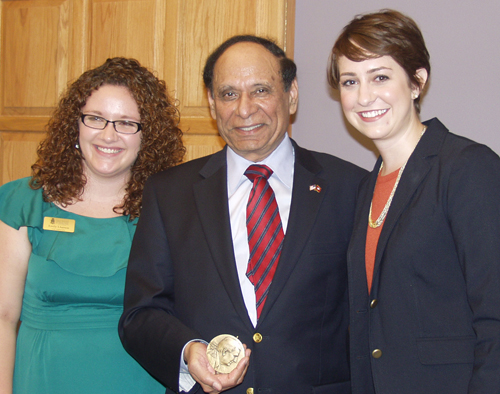
FAYETTEVILLE, Ark. – Record high U.S. agricultural exports of $137 billion are helping create good job prospects for students graduating from institutions such as the Dale Bumpers College of Agricultural, Food and Life Sciences at the University of Arkansas, the nation's chief agricultural negotiator told students during a campus visit on Monday, Oct. 8.
Ambassador Islam A. Siddiqui of the Office of the U.S. Trade Representative spoke to more than 100 students during a stop on his first day of a three-day visit to Arkansas that includes meetings with university officials, industry executives and agricultural producers. The program was moderated by students from the Bumpers College Honors Program and Bumpers College Ambassadors.
Next year's level of agricultural exports is expected to be $143 billion, Siddiqui said, noting that in the 1990s the level was at $60 billion. He credited the approval of free trade agreements for much of the growth in the export of agricultural products. The U.S. is hoping to expand such pacts and "is currently in high-level dialogue" with the European Union to secure an agreement, he said.
Agricultural exports have been a success story in international trade for the U.S. While the nation has an overall trade deficit with manufactured goods, agricultural products have fared better. "We export more (agricultural products) than we import," Siddiqui said, citing a $42 billion surplus.
Siddiqui noted that increased estimate for next year's agricultural products export level is about a month old and takes into account the effects of this year's drought. Even though drought conditions this year led to corn yield dropping from 145 to 125 bushels an acre, the rise in prices helped compensate for yield losses, he said.
The growth of agricultural markets in Asia is helping fuel the creation of jobs in the U.S. agricultural sector, Siddiqui explained. "The future for agriculture has not been brighter in the three decades that I've worked on agricultural issues," he said. "The demand as we look at the projections for growth in the economies in Asia and the Pacific, even with a slowdown from 11 percent to 6 or 7 percent, is still a lot better than the EU. These economies are still experiencing good growth and the demand for agricultural products is going to rise, so there's more demand for people."
Siddiqui said that years ago, Europe was the largest consumer of U.S. agricultural exports, but those numbers fell because of EU restrictions such as those on genetically modified soybeans and biotech corn. By 2011, about 70 percent of U.S. agricultural exports were headed for Asia.
"Because of that I think we are going to be using the Gulf of Mexico and the Panama Canal," he said, noting the current expansion project underway at the canal. "This will integrate the economies of the Asia-Pacific region with the economies of the Western Hemisphere. I think this will be a game changer for U.S. agriculture and exports in general. In order to move more commodities, we need to have bigger capacity in our ports here on the Gulf Coast, so we will need a bigger and more modern Panama Canal."
Discussing the Asia market, Siddiqui noted China is the top U.S. agricultural export market, buying about $20 billion worth of products in 2011.
Topics
Contacts
David Edmark, Interim Coordinator
Agricultural Communication Services
479-575-6940,